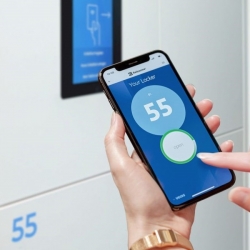January 15, 2021
Search Results for: management
January 14, 2021
Over two-thirds of British office workers currently suffer from imposter syndrome
by Jayne Smith • Flexible working, News, Working culture
 Asana, the work management platform, has launched a new research study, which highlights the increased levels of imposter syndrome, anxiety and burnout now being felt by British office workers. At a time when many workers are now facing the reality of a new national lockdown, over two-thirds (69 percent) claim they are currently suffering from imposter syndrome, and nearly half (45 percent) say this has increased while operating in a remote working environment. (more…)
Asana, the work management platform, has launched a new research study, which highlights the increased levels of imposter syndrome, anxiety and burnout now being felt by British office workers. At a time when many workers are now facing the reality of a new national lockdown, over two-thirds (69 percent) claim they are currently suffering from imposter syndrome, and nearly half (45 percent) say this has increased while operating in a remote working environment. (more…)
January 13, 2021
Office design will respond to the events of the past year as it always has – by getting better
by Oliver Ronald • Comment, Workplace design
 You may have heard that history repeats itself, but that’s not really true. It doesn’t repeat. It rhymes. And nowhere is this more true than when it comes to office design. It’s worth bearing this in mind when we consider the effects of the events of 2020. Not only the pandemic and lockdown, but also the longer term economic, social and individual consequences. The details of this may be unprecedented, as many people have suggested, but the dynamics of it are not. We have not been here before, but we’ve been somewhere very like it. (more…)
You may have heard that history repeats itself, but that’s not really true. It doesn’t repeat. It rhymes. And nowhere is this more true than when it comes to office design. It’s worth bearing this in mind when we consider the effects of the events of 2020. Not only the pandemic and lockdown, but also the longer term economic, social and individual consequences. The details of this may be unprecedented, as many people have suggested, but the dynamics of it are not. We have not been here before, but we’ve been somewhere very like it. (more…)
January 8, 2021
Fewer than half of employees in Europe feel trusted at work
by Jayne Smith • News, Working culture
 A new survey from Catalyst claims that only 46 percent of employees in Europe report often or always being trusted at work. This experience of being trusted is consequential; as the data highlights, when managers lead more inclusively, experiences of trust increase, and organisations as well as employees benefit. (more…)
A new survey from Catalyst claims that only 46 percent of employees in Europe report often or always being trusted at work. This experience of being trusted is consequential; as the data highlights, when managers lead more inclusively, experiences of trust increase, and organisations as well as employees benefit. (more…)
January 4, 2021
Supporting change during the pandemic with Simplicity Smart Lockers
by Kimberley Hutchinson • Company news, Furniture
 The way in which we work has changed in a way no one would have ever predicted as a result of last year’s pandemic. Consequently, many businesses have chosen to adopt to an agile working practise. This coupled with the rapid evolution of the hybrid workplace has allowed more employees than ever the flexibility to work from home, many people however still crave that interaction with colleagues, and the ‘corridor conversations’ that cannot be replicated via Zoom and can only happen with workplace collaboration. (more…)
The way in which we work has changed in a way no one would have ever predicted as a result of last year’s pandemic. Consequently, many businesses have chosen to adopt to an agile working practise. This coupled with the rapid evolution of the hybrid workplace has allowed more employees than ever the flexibility to work from home, many people however still crave that interaction with colleagues, and the ‘corridor conversations’ that cannot be replicated via Zoom and can only happen with workplace collaboration. (more…)
December 18, 2020
Working from home stresses have had the greatest impact on women
by Neil Franklin • Flexible working, News, Wellbeing
 A review of research in organisational and workplace psychology conducted by an international team of academics claims that working from home has been more disruptive for women than men. The review paper, entitled COVID-19 and the Workplace: Implications, Issues, and Insights for Future Research and Action and originally published in American Psychologist, features urgent insight from UCL School of Management Professor, Sunny Lee into the sex- and gender-related implications of changes in work practices that have taken place over the course of 2020. (more…)
A review of research in organisational and workplace psychology conducted by an international team of academics claims that working from home has been more disruptive for women than men. The review paper, entitled COVID-19 and the Workplace: Implications, Issues, and Insights for Future Research and Action and originally published in American Psychologist, features urgent insight from UCL School of Management Professor, Sunny Lee into the sex- and gender-related implications of changes in work practices that have taken place over the course of 2020. (more…)
December 17, 2020
Organisations weigh up options to make workplace fit for the future
by Neil Franklin • News, Property
 Avison Young, realestateworks and HLM Architects have launched a new report that assesses the impact of this year’s pandemic on workplace and corporate real estate strategies in the longer-term. Over 100 private and public sector companies were asked about their evolving approach to working culture, office design and portfolio strategies in the context of multiple forces of change, including greater resilience, the decarbonisation agenda, personalisation, remote working and the integration of the physical and virtual workspaces. (more…)
Avison Young, realestateworks and HLM Architects have launched a new report that assesses the impact of this year’s pandemic on workplace and corporate real estate strategies in the longer-term. Over 100 private and public sector companies were asked about their evolving approach to working culture, office design and portfolio strategies in the context of multiple forces of change, including greater resilience, the decarbonisation agenda, personalisation, remote working and the integration of the physical and virtual workspaces. (more…)
December 16, 2020
The weakness of purpose and the shift to problem-solving
by Steven van Belleghem • Business, Comment
 BlackRock is one of the largest asset management companies on the planet. Each year, at the start of January, the CEO Larry Fink writes a letter addressed to the other CEOs of the world. In his New Year’s letter for 2020, Fink appealed in particular to his fellow CEOs’ sense of social responsibility. In particular, he focused in on the risks faced by the climate. “Climate risk is an investment risk,” and he called on all companies, both public and private, to create greater societal added value. “Society is looking increasingly to companies to solve social and economic problems,” he concludes, so asset managers should be encouraged to invest in companies with a ‘purpose’. (more…)
BlackRock is one of the largest asset management companies on the planet. Each year, at the start of January, the CEO Larry Fink writes a letter addressed to the other CEOs of the world. In his New Year’s letter for 2020, Fink appealed in particular to his fellow CEOs’ sense of social responsibility. In particular, he focused in on the risks faced by the climate. “Climate risk is an investment risk,” and he called on all companies, both public and private, to create greater societal added value. “Society is looking increasingly to companies to solve social and economic problems,” he concludes, so asset managers should be encouraged to invest in companies with a ‘purpose’. (more…)
December 16, 2020
People centric innovation will be key business priority in near future
by Jayne Smith • Business, News
 The pandemic has shaken up business priorities and many predict that it will continue to have lasting influence on the future direction of organisations. It is predicted that innovation and more compassionate leadership will take centre stage, according to a new study by ‘Future Trends in Leadership & Management – shifting priorities’, from The Institute of Leadership & Management. (more…)
The pandemic has shaken up business priorities and many predict that it will continue to have lasting influence on the future direction of organisations. It is predicted that innovation and more compassionate leadership will take centre stage, according to a new study by ‘Future Trends in Leadership & Management – shifting priorities’, from The Institute of Leadership & Management. (more…)
December 15, 2020
The FM industry is held back by short-term thinking, research claims
by Jayne Smith • Business, Facilities management, News, Working culture
 Research published by VINCI Facilities claims that there is a lack of long-term strategic thinking amongst FM service providers and their customers that is limiting an opportunity to yield substantial business and social benefits. (more…)
Research published by VINCI Facilities claims that there is a lack of long-term strategic thinking amongst FM service providers and their customers that is limiting an opportunity to yield substantial business and social benefits. (more…)
December 12, 2020
Listening in on an enormous conversation about the workplace
by Mark Eltringham • Comment, Workplace design
One of the best tricks Clive James ever pulled was finding acceptance as a public intellectual in the UK. It’s not easy in a country in which it is possible to be too clever by half or even too clever for your own good. Stephen Fry continues to pull it off as does Mary Beard, but it’s a hell of a thing to achieve. In the UK it seems to rely on straddling at least two worlds. (more…)








 According to a recent
According to a recent 



















January 14, 2021
2021 presents the tech sector with once in a generation opportunities
by Uta Dresch • Comment, Flexible working, Technology